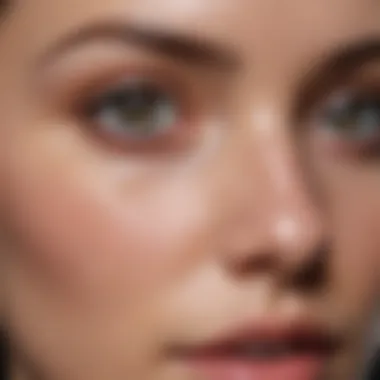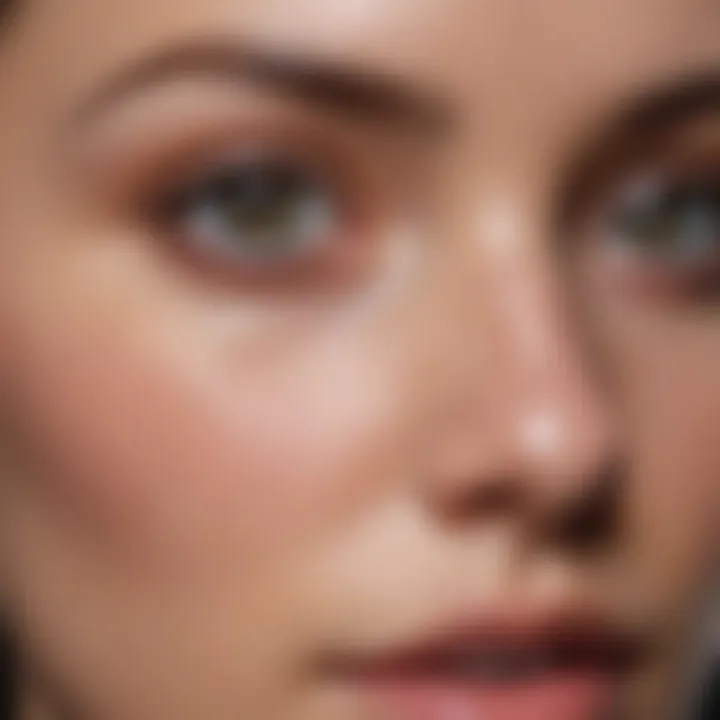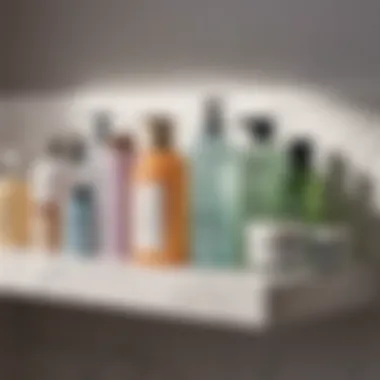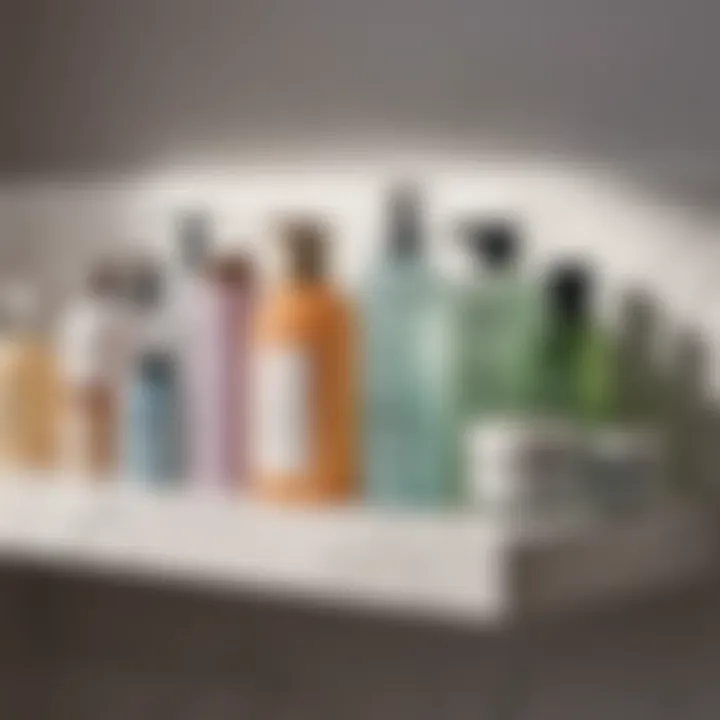Mastering Blackhead Removal: Effective Strategies


Intro
Blackheads are a common concern for many, affecting individuals of various ages and skin types. They are small, dark spots that form when pores become clogged with excess oil and dead skin cells. Understanding the causes of blackheads can empower individuals to tackle them more effectively. This article examines both immediate solutions and long-term strategies for clearance and prevention.
The presence of blackheads often signals underlying skin issues that require attention. By exploring effective treatments, over-the-counter products, and lifestyle adjustments, individuals can significantly improve their skin clarity. As we delve into these strategies, we will also highlight the importance of maintaining a consistent skincare routine, underscored by the necessity of adapting habits for lasting results. Our aim is to provide a thorough guide, addressing skincare needs comprehensively.
Fashion Trends
Seasonal Styles
Although blackheads aren't a fashion trend, the overall appearance of the skin can influence clothing choices and self-confidence. Seasonal changes, such as summer and winter, can impact skin type and the prevalence of blackheads. In warmer months, sweat and increased oil production often lead to clogged pores, while colder weather can dry out skin, prompting excess oil production in response.
Influencer Inspirations
Social media influencers often share their skincare journeys, making various products and techniques more accessible. Some well-known influencers highlight specific treatments or daily routines that can help minimize the occurrence of blackheads. Following their lead can inspire adopting new products or methods tailored to specific skin types, enriching one’s approach to skin clarity.
Beauty Tips
Skincare Routines
Developing an effective skincare routine is essential for preventing and treating blackheads. This may include:
- Cleansing: Utilize a gentle facial cleanser twice daily to remove dirt and oil.
- Exfoliating: Exfoliation, two to three times a week, helps to eliminate dead skin cells that clog pores.
- Moisturizing: Use a non-comedogenic moisturizer to keep skin hydrated without clogging pores.
- Sun Protection: Applying sunscreen daily can prevent skin damage and help maintain skin health.
Consistent application of these steps can yield significant improvements over time.
Makeup Techniques
For individuals who wear makeup, choosing non-comedogenic products is crucial. Here are some tips:
- Use Oil-Free Foundations: These can help minimize the appearance of blackheads.
- Avoid Heavy Creams: Thick creams and products can contribute to clogged pores.
- Remove Makeup Properly: Always remove makeup thoroughly to prevent buildup in pores.
Product Reviews
Trending Products
The market offers various products targeting blackheads. Notably, formulations containing salicylic acid can penetrate pores, reducing oil and helping prevent blackhead development. Look for brands like Neutrogena and Paula's Choice, which are well-regarded for their efficacy in treating blackheads.
Comparison Guides
When considering skincare products, comparing formulations can aid in selecting the best fit for individual needs. Analyzing factors such as ingredients, user reviews, and skin type compatibility can lead to more informed decisions. Using platforms like Reddit or beauty blogs can offer insights and personal experiences related to product effectiveness.
"A consistent skincare routine and informed product choices can greatly impact skin clarity over time."
By focusing on these key areas, individuals can effectively manage and reduce the prevalence of blackheads. Thus, achieving clearer skin ultimately contributes to enhanced overall wellbeing.
For further reading on skincare and skin health, check out Wikipedia and Britannica.
Understanding Blackheads
Understanding blackheads is essential for developing effective strategies to eliminate them. Blackheads are a type of acne caused by clogged hair follicles. Knowing their nature, how they form, and what drives their occurrence can significantly influence skincare regimens. This knowledge enables individuals to choose the correct products and develop effective routines tailored for their specific skin types.
What Are Blackheads?
Blackheads are small, dark formations on the skin's surface, commonly found on the nose, chin, and forehead. They occur when hair follicles become blocked with a mixture of oil, dead skin cells, and bacteria. Here, exposure to air causes oxidation, giving them their distinctive dark color. Unlike other types of acne, blackheads are non-inflammatory, meaning they do not result in swelling or redness. Since understanding what blackheads are lays the foundation for addressing them, it is crucial for anyone looking to enhance their skin clarity.
The Science of Oil and Pores
Oil, or sebum, is produced by sebaceous glands located beneath the skin's surface. Its primary role is to lubricate and protect the skin. When excess oil accumulates within a hair follicle, it creates a perfect environment for dead skin cells to mix. This mixture can obstruct the pore opening, leading to the development of blackheads. Various factors can influence sebum production, including hormonal fluctuations and dietary choices, presenting multiple avenues for those seeking to eliminate blackheads. Recognizing the interplay between oil and skin health is vital for effective care.
Common Causes of Blackheads
Several factors contribute to the formation of blackheads. Some of the most common include:


- Hormonal Changes: Fluctuations, especially during puberty, menstruation, or pregnancy, can increase oil production.
- Poor Skincare Routines: Inconsistent cleansing can allow oil and dirt to accumulate, exacerbating the problem.
- Certain Cosmetic Products: Comedogenic products can clog pores, leading to excess buildup.
- Diet: Foods with high sugar content or dairy may impact skin health and contribute to blackhead development.
- Genetics: Studies suggest that individuals with a family history of acne may have a higher likelihood of developing blackheads.
Understanding these causes is the first step in formulating strategies against them, allowing for tailored solutions that target the root of the issue.
Skin Types and Blackheads
Understanding how skin types relate to blackhead formation is essential for anyone looking to improve their skin health. Blackheads occur when hair follicles become clogged with oil, dead skin cells, and bacteria. However, not all skin types are affected equally. Thus, identifying one's skin type can be a pivotal first step in developing a targeted approach to skin care. This section will dive into the nuances of skin types and their connection to blackheads.
Identifying Your Skin Type
Knowing your skin type is crucial for selecting the right products and treatments. There are five primary skin types each with its own characteristics:
- Normal: Balanced skin, neither oily nor dry with few blemishes.
- Oily: Excess sebum production leading to a shiny appearance and enlarged pores.
- Dry: Lacks moisture and can appear flaky or rough; prone to irritation.
- Combination: A mix, with some areas oily and others dry.
- Sensitive: Easily irritated, may react to various products.
To identify your skin type, consider the following:
- After cleansing, wait for an hour. Assess your skin's feel; if it feels tight, you likely have dry skin.
- If your forehead, nose, and chin are shiny, you may have oily skin.
- If some areas are oily and others feel dry, you could have combination skin.
- Sensitive skin may exhibit redness or irritation following product use.
How Skin Type Affects Blackhead Formation
The development of blackheads is closely associated with the skin type. Each type presents unique challenges and influences the likelihood of blackhead formation:
- Oily Skin: High sebum production can clog pores. Individuals with oily skin often find blackheads more common, especially on the nose and chin.
- Dry Skin: Even though it might not seem obvious, dry skin can also contribute to blackheads. When skin is too dry, it may produce more oil to compensate, increasing the chance of clogged pores.
- Combination Skin: This skin type may have blackheads in certain areas while remaining clear in others. Products used need to address both oily and dry areas effectively.
- Sensitive Skin: Often confused by various external factors, this skin type may develop blackheads due to allergic reactions or irritation from harsh products, worsening pore issues.
Proper management of your specific skin type can significantly reduce the occurrence of blackheads. Knowledge of your skin enables you to choose the correct cleansers, exfoliants, and treatments that do not exacerbate oil production or strip the skin of moisture. This conscious choice helps in both the prevention and treatment of blackheads.
Preventative Strategies
Preventing blackheads involves a comprehensive approach to skincare, diet, and lifestyle choices. Recognizing the role of preventative strategies is crucial in achieving and maintaining clear skin. Blackheads are not solely a cosmetic concern; they arise from a combination of excess oil, dead skin cells, and bacteria, making it essential to understand how to reduce their formation. Replacing harmful habits with effective routines can significantly diminish the chances of their development.
Daily Skincare Routine
Cleanser Selection
Selecting the right cleanser is fundamental to any skincare regimen, especially for preventing blackheads. A good cleanser should effectively remove dirt, oil, and impurities without stripping the skin of its natural moisture. Look for a cleanser containing salicylic acid, as it penetrates deep into pores, unclogging them and reducing the formation of blackheads. While gel-based cleansers often work well for oily skin types, cream cleansers can be more suitable for dry skin.
However, over-cleansing can lead to irritation and rebound oiliness, making moderation essential.
Exfoliation Techniques
Regular exfoliation is key to maintaining skin clarity. By removing dead skin cells, exfoliation helps prevent clogged pores that can lead to blackheads. There are two primary types of exfoliation: mechanical and chemical. Mechanical exfoliation involves scrubs or brushes, while chemical exfoliation employs acids such as glycolic or lactic acid. Chemical exfoliants are often more effective because they work underneath the skin's surface.
With proper use, exfoliation can enhance skin texture and promote cell turnover. However, excessive exfoliation can disrupt the skin barrier, resulting in redness and sensitivity.
Moisturizer Recommendations
Even individuals with oily skin benefit from using a moisturizer. A suitable moisturizer helps balance oil production and combats dehydration, which can encourage skin to produce excess oil. Look for non-comedogenic moisturizers with lightweight formulations. Gel-based moisturizers often provide hydration without clogging pores, making them a popular choice for oily skin types.
However, it's important to choose products without heavy fragrances or irritants, as these can exacerbate sensitivity in the skin.
Dietary Factors
Impact of Diet on Skin Health
Diet significantly influences overall skin health. Foods rich in antioxidants, vitamins A, C, and E, and omega fatty acids can foster a clearer complexion. A diet high in processed foods, sugars, and dairy has been linked to increased oil production and could trigger breakouts. Adopting a well-rounded diet with a focus on whole foods can lead to improvements in skin clarity over time.
Research suggests that incorporating anti-inflammatory foods may reduce the likelihood of acne formation. However, individual reactions can vary, making it essential to understand how your diet specifically affects your skin.
Foods to Include or Avoid
To maintain clear skin, certain foods should be prioritized or limited.
- Include:
- Avoid:


- Leafy greens
- Nuts and seeds
- Fatty fish like salmon
- Berries
- Sugary snacks and drinks
- Refined carbohydrates
- Dairy products
- Greasy and processed foods
These dietary adjustments can contribute to a healthier skin environment, potentially reducing the frequency and severity of blackheads.
Home Remedies for Blackheads
Home remedies for blackheads offer a popular alternative to commercial products and treatments. These remedies are often easily accessible, cost-effective, and can be made using common household items. While they may not provide immediate results like professional treatments, they contribute to long-term skin care and prevention. Incorporating such remedies can empower women to take control of their skincare routine and promote a sense of well-being.
Natural Exfoliants
Natural exfoliants are critical for maintaining skin clarity. They help remove dead skin cells and prevent clogged pores. Here are two notable examples:
Use of Baking Soda
The inclusion of baking soda in skincare is highly discussed due to its properties. Baking soda acts as a mild abrasive, making it an effective natural exfoliant. It helps lift away dirt and debris from the skin. This quality is why baking soda is seen as a beneficial choice in this article.
- Advantages: Baking soda is inexpensive and easily available. It can be combined with water to form a paste, which is simple to apply. Most people can use it without experiencing irritation, making it accessible for many skin types.
- Disadvantages: However, the alkaline nature of baking soda can disrupt the natural pH balance of the skin. Overuse might lead to dryness or irritation. Therefore, it is vital to use it sparingly and follow up with a good moisturizer.
Benefits of Honey and Sugar
Using honey and sugar as a combination is another effective method. Honey possesses antibacterial properties, which can help clear acne while sugar acts as a natural exfoliant. Together, they provide a gentle yet effective way to remove dead skin and keep pores clean. This combination is especially beneficial for individuals with sensitive skin as it is less abrasive compared to other exfoliants.
- Advantages: Honey hydrates the skin and adds moisture, while sugar provides the exfoliating action. This balance is why the mixture is often recommended in skincare discussions across various platforms.
- Disadvantages: On the flip side, some individuals may be allergic to honey or experience irritation. It's essential to conduct a patch test before using the mixture on the face.
Steam Treatment
Steam treatments serve an important role in blackhead removal. The application of steam opens up pores, allowing for deeper cleansing. This technique prepares the skin to receive other treatments more effectively. Here’s how it works:
- Functionality: By gently steaming the face, built-up oil and debris can be loosened. This process enhances the efficacy of exfoliation and makes it easier to extract blackheads.
- Considerations: Those with sensitive skin should approach steaming with caution. Overusing steam can lead to irritation or dryness. Limiting the exposure to about 10 minutes is advised to avoid these risks.
"Home remedies can empower individuals to manage their skin health more effectively, blending natural ingredients with time-tested techniques."
Over-the-Counter Products
Over-the-counter products play a crucial role in any skincare regimen aimed at eliminating blackheads. They are widely accessible, provide immediate solutions, and often come with a lower risk of adverse effects when used correctly. Whether you are dealing with occasional blockages or persistent blackheads, these products can make a significant difference. They allow for convenient home treatment, helping individuals to manage their skin issues without the need for frequent dermatologist visits.
Cleansers and Exfoliants
Salicylic Acid Products
Salicylic acid stands out as a potent ingredient when considering options for blackhead elimination. This beta hydroxy acid has a unique ability to penetrate the pores and dissolve excess oil and dead skin cells. This makes it particularly effective in preventing and treating blackheads.
One of its key characteristics is its exfoliating nature, which allows for a thorough cleansing of the skin. This ensures that clogged pores are adequately addressed, reducing the likelihood of new blackheads forming. Salicylic acid products are recommended for those with oily and combination skin types, given their effectiveness in controlling sebum production.
The unique feature of salicylic acid products is their ability to enhance the skin's natural exfoliation process. By doing so, they not only clear existing blockages but also promote overall skin health. However, there are some disadvantages to consider. Overuse can potentially lead to dryness or irritation, particularly for individuals with sensitive skin. Gradual introduction into the skincare routine is advised.
Benzoyl Peroxide Options
Benzoyl peroxide is another popular choice in over-the-counter treatments for blackheads. It operates primarily by targeting bacteria that contribute to acne formation, while also helping to eliminate excess oil in the pores. This makes it a beneficial option for those who may also struggle with acne in addition to blackheads.
A key characteristic of benzoyl peroxide is its strong antibacterial properties. It can reduce inflammation and the risk of infections that can arise from clogged pores. This makes it an essential ingredient in many acne-targeting formulations.
The unique feature of benzoyl peroxide options is their availability in various concentrations, which allows users to select a formula that best suits their skin's needs. This flexibility can lead to advantages such as targeted treatment without excessive irritation. However, like salicylic acid, benzoyl peroxide can cause dryness when used excessively. It is essential to follow product instructions carefully.
Pore Strips and Masks
Pore strips and masks have gained popularity as quick fixes for immediate blackhead concerns. These products often contain ingredients that help to draw out impurities from the pores. They create a vacuum-like effect when removed, effectively pulling out debris including blackheads.
While they can be satisfying to use, they are generally not recommended as a long-term solution. They may provide temporary relief but do not contribute to the overall health of the skin. Users should combine these with more holistic approaches, such as consistent cleansing and exfoliation, for best results.
"Over-the-counter products serve as a frontline approach to managing blackheads, making them essential components in personal skincare routines."


In summary, when selecting over-the-counter products to tackle blackheads, it is essential to consider your skin type and specific needs. Both salicylic acid and benzoyl peroxide offer strong benefits, but understanding their characteristics and potential disadvantages empowers individuals to make informed choices. Pore strips and masks can provide immediate results, but should be used in conjunction with other skincare practices for optimal skin health.
Professional Treatments for Blackheads
Professional treatments for blackheads can provide significant benefits for those who struggle to maintain clear skin. These treatments not only target existing blackheads but also help to prevent future occurrences. Understanding the various options available allows individuals to choose the most suitable method for their skin type and severity of blackhead formation.
Several factors make professional treatments an appealing choice. First, they are typically performed by licensed professionals who possess the expertise to deliver effective care. This reduces the risk of complications that may arise from at-home treatments, such as skin irritation and infection. Moreover, professional treatments often yield immediate results, giving individuals a sense of satisfaction after just one session.
When considering professional options, it is essential to assess personal skin health and discuss any current skin conditions with the chosen expert. Not all treatments are suitable for every skin type. Thus, consulting a dermatologist or licensed esthetician can provide insights tailored to one's needs.
Professional involvement ensures a higher level of treatment efficacy and safety, crucial factors in managing blackheads effectively.
Facials and Extractions
Facials are a popular option for addressing blackheads. They typically include thorough cleansing, gentle exfoliation, and hydration. The primary purpose of a facial is to purify the skin.
During a facial, a professional can perform manual extractions, safely removing blackheads using specialized tools. This procedure minimizes the risk of damage to the skin compared to at-home extraction methods. By opting for regular facials, individuals can manage their blackheads effectively and improve skin texture over time.
Chemical Peels and Microdermabrasion
Chemical peels and microdermabrasion offer advanced options for blackhead treatment. Chemical peels involve applying a solution to the skin that exfoliates the top layers. This process helps to unclog pores and reduce the appearance of blackheads. Depending on the peel’s strength, downtime may vary. However, many individuals experience smoother skin shortly after recovery.
Microdermabrasion, on the other hand, involves the use of a device to exfoliate the outer layer of skin. This method also promotes new skin growth and can improve overall skin tone. Both options are effective but may require multiple sessions for optimal results. Therefore, it is vital to assess the treatment plan's suitability concerning individual skin types.
Laser Treatments
Laser treatments represent another advanced method for addressing blackheads. These treatments use focused light to target the sebaceous glands, reducing excess oil production that leads to blackhead formation. Additionally, laser treatments can improve skin texture and reduce the size of pores.
The precision of laser therapy permits targeted action with minimal damage to surrounding tissue. As a result, recovery times are usually shorter when compared to other invasive methods. Furthermore, many patients report long-lasting results after completing a series of treatments. It’s crucial to consult a certified professional to evaluate the most appropriate type of laser for specific skin concerns.
Long-Term Skin Health Maintenance
Maintaining skin health in the long run is more than just a series of quick fixes. It encompasses a proactive approach that seeks to prevent issues before they arise and sustain the clarity and texture of the skin. Long-term skin health maintenance helps to reduce the chances of blackheads and other skin concerns from becoming a recurring problem. Focusing on this aspect of skincare not only addresses the aesthetic component but also contributes significantly to overall skin vitality and resilience.
Regular Skin Assessments
Performing regular skin assessments is vital. This involves periodically examining the skin for any noticeable changes. You can do this in several ways:
- Observe your skin closely: Look for variations in texture, tone, or the appearance of new blemishes. Pay attention to areas that are prone to issues, like the T-zone.
- Keep a record of changes: Document skin conditions and reactions to products. It helps to identify patterns that could trigger blackhead formation.
- Consult a dermatologist: For thorough assessments, it is advisable to seek professional opinions. Dermatologists can provide insights and recommend appropriate treatments or products for your skin type.
Regular assessments enable timely detection of skin problems. This foresight helps in managing skin health more effectively, preventing simple issues from escalating into more complex conditions. Staying aware of your skin's needs is a cornerstone of effective long-term maintenance.
Adjusting Routines as Needed
Skin types and conditions can evolve, requiring adjustments to your skincare routine. It is essential to periodically reevaluate your methods and products:
- Be attuned to season changes: Your skin may behave differently in winter compared to summer due to humidity levels and temperature shifts. Adjustments in hydration and exfoliation frequency may be necessary.
- Consider lifestyle changes: Factors such as stress, diet, and environment impact skin health significantly. Modify your routine if you make lifestyle changes that affect your skin's condition.
- Experiment with new products cautiously: When introducing new treatments or products, do so one at a time to monitor their effects. If a product aggravates skin issues, reevaluation is crucial.
The skin's needs are not static. Adapting your routine prolongs the benefits of your skincare efforts and helps in preventing blackheads effectively. Through careful observation and adjustments, the aim is to create a sustainable strategy for flawless, clear skin.
Epilogue
In the journey towards clearer skin, addressing blackheads requires holistic consideration. It is vital to understand that blackheads are not merely surface-level irritations; they are the result of excess oil, dead skin, and clogged pores. Therefore, the strategies discussed throughout this article are not only methods of removal but also essential practices for long-term skin health. Incorporating these strategies into daily life can lead to a significant reduction in blackhead occurrence, enhancing overall skin clarity.
The importance of a consistent skincare routine cannot be overstated. Consistency helps to maintain the skin's condition and keep it in balance. Adequate cleaning, exfoliation, and moisturization create a foundation for healthy skin. Moreover, dietary choices and lifestyle factors significantly impact skin integrity, making it essential to align habits with skincare goals.
Furthermore, acknowledging individual skin types and adjusting products accordingly is a crucial element in personal skincare. Everyone's skin responds differently to treatments. By understanding and addressing these differences, one can effectively reduce the likelihood of blackhead formation.
Regular skin assessments and adjustments can prevent future issues.
Finally, it’s vital to consider professional treatments as options for stubborn blackheads. Procedures offered by dermatologists can yield results that over-the-counter products may not achieve alone. In summary, effective management and elimination of blackheads blend routine self-care with informed choices.
Key Takeaways
- Understanding Blackheads: Comprehend what blackheads are and their causes to take preventive action.
- Skincare Routine: Regular cleansing, exfoliating, and moisturizing helps maintain skin balance
- Diet Matters: Nutritional choices influence skin health and appearance.
- Adaptability: Modify skincare practices based on skin type and changes in environment or health.
- Professional Help: Don’t hesitate to seek professional solutions for persistent issues.
Encouragement for Ongoing Care
Caring for your skin does not end with the elimination of blackheads. Rather, it is an ongoing process that demands attention. Develop a tailored skincare routine and stick to it. Make gradual changes so that you can observe how your skin reacts. This awareness can lead not only to clearer skin, but a deeper understanding of your skin's needs.
Engagement with the skin health community can also provide further insights. Participate in forums and discussions such as those found on Reddit or Facebook, where others share experiences and recommendations. The dialogue can motivate you to explore new skincare avenues or simply affirm your current regime. Overall, prioritizing your skincare is a commitment to enhancing your wellbeing.



